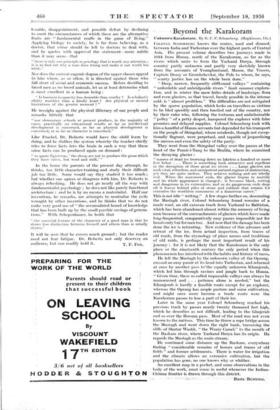• - Beyond the Karakoram -
Unknown Karakoram. By R. C. F. Schomberg. (Hopkinson. 15s.) COLONEL SCHODIBERG knows the routes, used and disused, between Indireand TUrkestahover the-highest parts of Central
Asia. His present volume describes two journeys made in
1934 from Hunza, north of the Karakoram, as far as the rivers which unite to form the Yarkand Darya, _through country partly unknown and partly eery sketchily known
from the accounts of Younghusband, Mason, the Vissers, Captain Deasy or Grombchevksi, the Pole to whom, he says, " scanty justice hai on the whole been done."
" Deep, narrow, frequently cliffbound valleys " containing
" unfordable and unbridgeable rivers " limit summer eXplora- tion, and in winter- the snow hides details of landsCape, flora and even glaciers, so that travel, barely possible in the intense
cold, is " almost profitless." The difficulties are not mitigated by the sparse population, which -looks on travellers as victims to be bled speedily and then hustled out of the country, nor by their ruler who, following the tortuous and unfathomable " policy " of a petty despot, hampered the explorer with false promises and delayed supplies. Colonel Schomberg took with him a handful of Hunza servants but depended for his transport on the people of Shingshal, whose misdeeds, though not excep- tionally flagrant, were perpetual, and capable of jeopardising
the success and even the safety of the Party.'
They went from the Shingshal valley over the passes at the head of the Pamir-i-Tang to the Braldu, where he examined the decaying glacier :
" masses of dead ice frowning down on lakelets a hundred or more feet below . . . There is something both attractive and repellent in the disruption of these great-ice rivers .- . . Large glaciers are such vital, relentless, and omnipotent natural engines of destruction, yet they are quite useless. They achieve nothing and are wholly evil. When the movement ends, the glacier begins to mortify and its whole appearance is changed ; it becomes black,, rotting and dangerous in its extremities, and as its gangrenous ends drop off it leaves behind piles of stone and rubbish that remain fcr centuries the worthless monument of a disastrous career."
This is not idle " writing." A few stages further on, descending the Mustagh river, Colonel .Schomberg found -remains of a made road, an old caravan track from Yarkand to Baltistari, which has been abandoned almost within the memory ofliving men because of the encroachments of glaciers which havelnade long-frequented, comparatively easy passes impossible trot for
beastO only but for men too. Arid now that the damage lies beeir done the ice is retreating. New evidence of this advance and retreat of the ice, from actual inspection, from traces of old roads, from the etymology of place names and traditions of old raids, is perhaPs the most important result of his journey : for it is not likely *that the Karakoram is ihe only
place or the nineteenth century the only period' when this phenomenon has interfered with the habits and history of races.
He left the Mustagh.by the unknown valley of the Oprang, crossed an easy pamir at its head into Turkestan, and returned at once by another pass to-the equally unknown Khunjerab,
which led him through ravines and jungle back to Hunza. " Given time, these so-called impassable valleys can always be manoeuvred and . . . patience alone is needed," but the Khunjerab is hardly a feasible route except for an explorer, whereas the Oprang has ample pasture and some cultivation, and might once more become a trade route were the Karakoram passes to lose a part of their ice. Later in the same year Colonel Schomberg reached his previous track by passes nearly twenty thousand feet high, which he describes as not difficult, leading to the Ghujerab
and so over the Boesan-A pass.. Most of the road was not even known to the natives. This time'e threw a rope bridge across the Mustagh and went down the right bank, traversing the
cliffs of Shutur Washk, " the Weary Camel," to the mouth of
the Raskam river, where Yarkand Darya has its origin. He regards the Mustagh as the main stream.
He continued some distanee up the Raskam, everywhere finding " considerable remains of houses and traces of old fields " and former settlements. There is water for irrigation and the climate allows an extensive cultivation, but the population has gone, no one knows why or whither.
An excellent map in a pocket, and some observations in the body of the work, *must come* in useful whenever the Indian- ' Chinese frontier is drawn through this district.










































 Previous page
Previous page